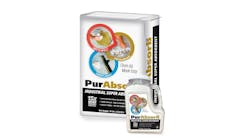In recent years, entire businesses have been built around the concept of selling products, seminars or training to help make a fleet or shop more environmentally friendly. One impactful way to green a fleet or shop is also the most simple, and it starts with an elemental tool of any fleet: shop towels.
Selecting reusable shop towels rather than disposable shop towels offer a number of benefits, says Joseph Ricci, president and chief executive officer of TRSA (www.trsa.org), an international organization representing companies that supply reusable laundered garments, uniforms, linens, mats, towels and other products necessary for businesses to operate safe, clean facilities and provide a clean, attractive environment and image. Among them:
1. Save Money
A single reusable shop towel can handle 10 light-soil wiping tasks or two very heavy wiping tasks, compared to one disposable, “saving anywhere from 83 to 15 percent, respectively, on related costs, says Ricci.
2. Less Energy
Both reusables and disposables consume the most energy in their genesis: acquiring raw materials for their manufacturing. But disposable wipes use more energy once manufacturing begins.
“Overall energy usage for reusables is just 10 percent of the requirement for nonwoven and paper towels,” Ricci says, “even though cloth towels are shipped back and forth to textile services plants for laundering.”
3. Improved Air Quality
Substituting reusable shop towels for 10 disposables improves air quality overall “by decreasing smog, carbon monoxide and saving the equivalent of one mile’s worth of carbon dioxide from an auto tailpipe,” he observes. “This is accomplished during the manufacturing process in which disposable shop towels require more natural resources and generate more discharges into the environment than their reusable counterparts.”
4. Reduce Solid Waste
Throughout the life cycle of a disposable industrial wiper, its impact on solid waste is greater than reusables, for certain tasks, explains Ricci. A three-disposable task that a shop towel performs and then requires washing generates 3.9 times as much solid waste. A lighter one-disposable task, the equivalent of a job that a shop towel does five times before washing generates 5.1 times as much solid waste.
5. Less Packaging Waste
Single-use products generate more packaging waste per task than their reusable equivalents, he says, noting that some 38 million tons of packaging enter the waste stream annually.
By way of example, a two-disposable task that a shop towel handles before washing generates 8.5 times as much packaging waste.
“Reusable shop towels are, and have been, a safe, practical and infinitely more green automotive mainstay for nearly 100 years,” concludes Ricci.



